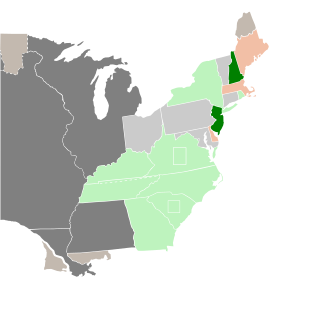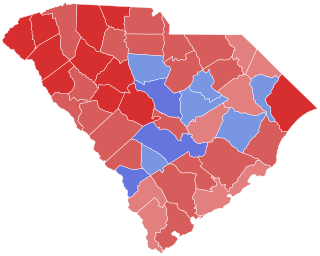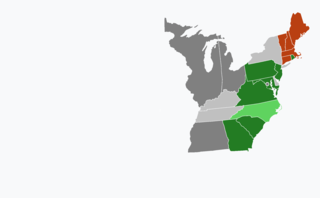
Richard Dobbs Spaight was an American Founding Father, politician, planter, and signer of the United States Constitution, who served as a Democratic-Republican U.S. Representative for North Carolina's 10th congressional district from 1798 to 1801. Spaight was the eighth governor of North Carolina from 1792 to 1795. He ran for the North Carolina Senate in 1802, and Federalist U.S. Congressman John Stanly campaigned against him as unworthy. Taking offense, Stanly challenged him to a duel on September 5, 1802, in which Stanly shot and mortally wounded Spaight, who died the following day.

Robert Goodloe Harper was an American soldier and politician. He was a member of the United States Senate from Maryland, serving from January 1816 until his resignation in December of the same year. He also served in the South Carolina House of Representatives (1790–1795), the U.S. House of Representatives from South Carolina (1795–1801), and in the Maryland State Senate. He is best remembered for the phrase, "Millions for defense, but not one cent for tribute" in connection with the XYZ Affair. The town of Harper, Liberia, is named after him.

The 1802–03 United States House of Representatives elections were held on various dates in various states between April 26, 1802 and December 14, 1803. Each state set its own date for its elections to the House of Representatives, either before or after the first session of the 8th United States Congress convened on October 17, 1803. They occurred during President Thomas Jefferson's first term in office.
John Hunter was an American farmer from Newberry, South Carolina. He represented South Carolina in the U.S. House from 1793 until 1795 and in the United States Senate from 1796 to 1798.
Charles Johnson was a Congressional representative from North Carolina. Johnson was born in Scotland; engaged as a planter; elected to the Continental Congress in 1781, 1784, and 1785, but did not attend; served in the state senate in 1781–1784, 1788–1790, and 1792 ; elected as a Republican in a special election to the Seventh Congress ; interment in Edenton Cemetery.

James Burchell Richardson was the 41st Governor of South Carolina from 1802 to 1804.
John Taylor was a United States Representative from South Carolina. His birth date is unknown. Taylor was a member of the South Carolina House of Representatives, 1802–1805. He was elected as a Republican to the Fourteenth Congress but was an unsuccessful candidate for reelection to the Fifteenth Congress in 1816 and for election to the Seventeenth Congress in 1820. His death date is unknown.

Elections in South Carolina are held to fill various local, state and federal seats. Special elections may be held to fill vacancies at other points in time.
Events from the year 1802 in the United States.

John Mathews was a Founding Father of the United States and lawyer from Charleston, South Carolina. He was a delegate to the Continental Congress from 1778 to 1781 where he endorsed the Articles of Confederation on behalf of South Carolina. On his return, he was elected the 33rd governor of South Carolina, serving a single term in 1782 and 1783.

The 1804–05 United States Senate elections were held on various dates in various states. As these U.S. Senate elections were prior to the ratification of the Seventeenth Amendment in 1913, senators were chosen by state legislatures. Senators were elected over a wide range of time throughout 1804 and 1805, and a seat may have been filled months late or remained vacant due to legislative deadlock. In these elections, terms were up for the senators in Class 2.

The 1802–03 United States Senate elections were held on various dates in various states. As these U.S. Senate elections were prior to the ratification of the Seventeenth Amendment in 1913, senators were chosen by state legislatures. Senators were elected over a wide range of time throughout 1802 and 1803, and a seat may have been filled months late or remained vacant due to legislative deadlock. In these elections, terms were up for the senators in Class 1.

North Carolina increased its apportionment from 10 to 12 seats after the 1800 census.

A special election was held in North Carolina's 8th congressional district on August 6, 1801, to fill a vacancy created when David Stone (F) resigned upon being elected to the Senate before the 7th Congress began.

A special election was held in North Carolina's 8th congressional district on October 15, 1802 to fill a vacancy left by the death of Charles Johnson (DR) on July 23, 1802.
A special election was held in South Carolina's 4th congressional district on April 12–13, 1802 to fill a vacancy resulting from the resignation of Thomas Sumter (DR) on December 15, 1801, upon being elected to the Senate.

The 2022 United States Senate election in South Carolina was held on November 8, 2022, to elect a member of the United States Senate to represent the state of South Carolina. Incumbent senator Tim Scott won reelection to a second full term, defeating state representative Krystle Matthews. This was the third consecutive election for this seat where both major party nominees were black.

United States gubernatorial elections were held in 1802, in 12 states, concurrent with the House and Senate elections.

The 1802 New Hampshire gubernatorial election took place on March 9, 1802. Incumbent Federalist Governor John Taylor Gilman won re-election to a ninth term, defeating Democratic-Republican candidate, former Governor and U.S. Senator John Langdon.












